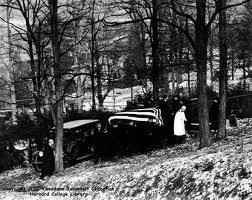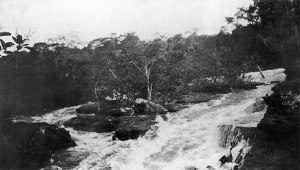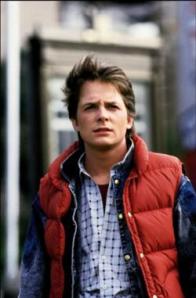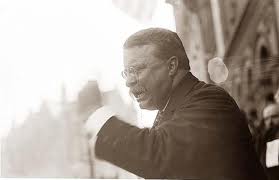 It was a cold, gray January day. The wind picked up the dusting of snow from the ground and flung it into their faces, stinging like needles. Tears froze to wind burned cheeks. The casket was slowly lowered into the frozen ground. A lone bugler played taps. Slowly, one by one, the people who had gathered, made their way down the 26 steps, down the long hill, and out of the cemetery until a lone figure remained. He stood motionless. His gaze locked on the hole before him. Tears stained his ruddy cheeks. His long coat flapped in the wind. His lips moved as if talking. Was he saying goodbye? Was he saying a prayer? Was he saying words of forgiveness to his now dead friend?
It was a cold, gray January day. The wind picked up the dusting of snow from the ground and flung it into their faces, stinging like needles. Tears froze to wind burned cheeks. The casket was slowly lowered into the frozen ground. A lone bugler played taps. Slowly, one by one, the people who had gathered, made their way down the 26 steps, down the long hill, and out of the cemetery until a lone figure remained. He stood motionless. His gaze locked on the hole before him. Tears stained his ruddy cheeks. His long coat flapped in the wind. His lips moved as if talking. Was he saying goodbye? Was he saying a prayer? Was he saying words of forgiveness to his now dead friend?
Theodore Roosevelt, the 26th President of the United States, died in the early hours of January 6, 1919. Now, two short days later, William Howard Taft, the 27th President of the United States, stood over his grave, weeping. Slowly he gathered himself, blinked away tears, and trudged down the pathway.
Once dear friends and allies, the men had not spoken in the last seven years. Taft served as Roosevelt’s Vice President. Hand-picked by Roosevelt to succeed him as President. During his term of presidency, disagreements arose between the two men. Roosevelt, then out of politics began to counter Taft in the press. Roosevelt, still popular with many, publicly lambasted Taft. The chasm between the two former friends widen as Roosevelt decided to run against Taft for the Republican nomination in 1912. The break became insurmountable when, after losing the nomination to Taft, Roosevelt decided to run as a third party candidate, essentially splitting the vote and giving the Presidency to Woodrow Wilson. Roosevelt shut Taft out of his life with hardly a second thought. Had Taft died first, would Roosevelt stood over his grave?
Yet, Taft made his way graveside that cold day in January. Later, in a letter to Edith Roosevelt, he would write, “I loved him always and cherish his memory.” A love and a friendship that survived, at least for Taft, despite the chasm created by words and deeds.
Reflecting on the relationship of Roosevelt and Taft really causes reflection on my own relationships. Is there someone with whom such a rift is present? Will someone be standing over my grave saying their peace to me or their god? Or, will I be standing over someone’s grave doing the same? It’s not hard to imagine in a lifetime of relationships that we have all been Taft and we have all been Roosevelt. What would you say on that cold wintry day? If you were aware of such an injured relationship, would you try to repair it before the end?
When I first heard the story, my mind immediately leapt to my sister. Our relationship had been fractured for many years. Incidents, actions, and words had created schism between us that I saw no hope of ever closing. At times it has felt like the Grand Canyon. However, in the last year we have started, with the help of my wife and my sister’s husband, we have begun to build a bridge. Over time, with continued conversation and understanding, the bridge will be fortified. It isn’t quite a Taft-Roosevelt moment, but it very well could have been.
As I think back over my professional life and reflect on the relationships formed there. Over the years I have had to have many of those “life altering conversations”, either because of downsizing, performance issues, or the dreaded “the company has outgrown you”. I tried to treat each person with respect, dignity and compassion. Some of those conversations were with colleagues that I considered friends. One such friendship survived the downsizing conversation at two different companies (yes the friendship survived, but I am guessing he won’t come work for me again!). Another relocated his family to accept a job offer from me and a year later we had to have the downsizing conversation. Amazingly to me, that friendship survived as well.
The one relationship that comes the closest to a Taft-Roosevelt relationship (and I am mortified to say, I was the “Roosevelt” in this situation) was with a friend. She and I had worked together for almost to a decade. During this time, we had become very close and developed a deep caring for each other. I can honestly say, I loved her (not in a romantic way, mind you). We shared many of life’s trials, tribulations, and celebrations. As my career progressed and I started moving in different circles, we grew apart. Still working for the same company, but no longer interacting on a daily basis. Some of it was the natural outcome of no longer working together on the same projects, but some of it was intentional on my part to “distance the relationship” as I first became her boss, then her boss’ boss, then her…well you get the idea. Years passed. Then…then she got sick. Very sick. Dying sick. The day I went to visit her in the hospital, no one was with her. Her husband, must have stepped out. The nurses were off doing their nursing-thing with other patients. It was just she and I. The only sound in the room came from the machines attached to her. She was in the final stages and was not conscious. I stood by her bed, stroked her hair, and told my friend I loved her. Did she hear me? Did she know? I was too late.
This series is about leadership and the lessons about leadership I learned while traveling with Teddy Roosevelt. What lesson can

AP Photo
be learned from the lone figure alongside the grave? Perhaps the lesson is to value the person, value the relationship, even when delivering bad news, or even when circumstances pull you apart. Lead from a position of empathy for the impact your words and deeds have on those around you. Perhaps the lesson is the old adage “you can be friendly, but you can’t be friends” just isn’t true.
#RooseveltRiver is my year long exploration with Dan Miller of Historical Solutions into leadership using the backdrop of history and the life of Theodore Roosevelt. To read more in this series, select “Roosevelt River” from the Category drop down on the right.
If anything you read here or in other posts strikes a chord, I would love to hear from you. Leave a comment and let me know your thoughts!
Find me on LinkedIn. Read my Posts on business and business relationships.
Follow me on Twitter (@jtongici)
Add me to your circles on Google+
Read my Posts on the changing role of the CIO posts on Intel’s IT Peer Network
 With credit to Bob Dylan for a great lyric, these times certainly are changing. In the last 100 days or so, we have all experienced tremendous change, change in the way we work (and in a lot of cases this change meant a loss of work) and change in the way we live. As our economy slowly begins to open up, many want to return to “normal”. But, normal isn’t there. Normal has changed, because we have changed.
With credit to Bob Dylan for a great lyric, these times certainly are changing. In the last 100 days or so, we have all experienced tremendous change, change in the way we work (and in a lot of cases this change meant a loss of work) and change in the way we live. As our economy slowly begins to open up, many want to return to “normal”. But, normal isn’t there. Normal has changed, because we have changed. 


 It was a cold, gray January day. The wind picked up the dusting of snow from the ground and flung it into their faces, stinging like needles. Tears froze to wind burned cheeks. The casket was slowly lowered into the frozen ground. A lone bugler played taps. Slowly, one by one, the people who had gathered, made their way down the 26 steps, down the long hill, and out of the cemetery until a lone figure remained. He stood motionless. His gaze locked on the hole before him. Tears stained his ruddy cheeks. His long coat flapped in the wind. His lips moved as if talking. Was he saying goodbye? Was he saying a prayer? Was he saying words of forgiveness to his now dead friend?
It was a cold, gray January day. The wind picked up the dusting of snow from the ground and flung it into their faces, stinging like needles. Tears froze to wind burned cheeks. The casket was slowly lowered into the frozen ground. A lone bugler played taps. Slowly, one by one, the people who had gathered, made their way down the 26 steps, down the long hill, and out of the cemetery until a lone figure remained. He stood motionless. His gaze locked on the hole before him. Tears stained his ruddy cheeks. His long coat flapped in the wind. His lips moved as if talking. Was he saying goodbye? Was he saying a prayer? Was he saying words of forgiveness to his now dead friend?




 A couple years ago I wrote a short eBook titled “
A couple years ago I wrote a short eBook titled “ roosevelt speaking and you will find hundreds of pictures but you would be very hard pressed to find any of him standing still behind a lectern. You will see him teeth bared, leaning forward, fist pounding in hand, or arms spread wide. Some of these were very much thought out, others were as natural to him as speaking itself. The audience was captivated, he was talking with them (not TO them), he was their voice. Roosevelt once declared “I’m am not public opinion, I am the public”, a bold statement certainly, but at the height of his presidency he was absolutely correct.
roosevelt speaking and you will find hundreds of pictures but you would be very hard pressed to find any of him standing still behind a lectern. You will see him teeth bared, leaning forward, fist pounding in hand, or arms spread wide. Some of these were very much thought out, others were as natural to him as speaking itself. The audience was captivated, he was talking with them (not TO them), he was their voice. Roosevelt once declared “I’m am not public opinion, I am the public”, a bold statement certainly, but at the height of his presidency he was absolutely correct.

